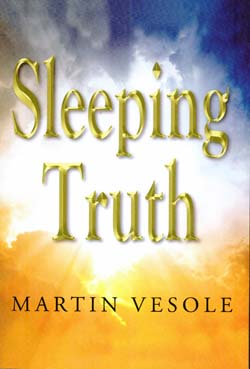Sleeping Truth by Martin Vesole, Shalom Rav Publishing © 2013, ISBN 978-1937416027, 355 pages.
By Donald H. Harrison

 SAN DIEGO—Mary Poppins was the Disney character who sang about a spoonful of sugar helping the medicine to go down. Presenting this story of a fictional debate between a Christian evangelical and a Reform-leaning Reconstructionist rabbi, who perhaps might be considered a Jewish-Buddhist, Vesole serves up the story with dollops of mystery and sexual attraction.
SAN DIEGO—Mary Poppins was the Disney character who sang about a spoonful of sugar helping the medicine to go down. Presenting this story of a fictional debate between a Christian evangelical and a Reform-leaning Reconstructionist rabbi, who perhaps might be considered a Jewish-Buddhist, Vesole serves up the story with dollops of mystery and sexual attraction.
Vesole, a former president of Temple Menorah in Chicago, imagines that the debate would command worldwide media coverage and TV audience attention. Such high interest was preceded by the discovery in a cave near Nazareth of a “Book of Emet,” allegedly written by a contemporary of Jesus. The book in some chapters agrees with the Christian gospels, but in some ways disagrees, particularly over the issue over whether Jesus was divine.
Defending the old time religion of Christianity against what is perceived as Emet’s attack is Mary Roberts, a fundamentalist televangelist, whose ideas are not as rigid as one might first gather. Giving the Jewish view of matters is Rabbi Joshua David Hetzel. A third panelist is a British historian of religion, not formally affiliated with any faith. And the moderator is a gay Unitarian minister. The setting is St. Louis, Missouri.
In the book, Vesole has Roberts retell the major stories of the Christian gospels, with Rabbi Hetzel frequently commenting that what Jesus taught was well within Jewish tradition. Had it not been for later Christian writers turning him from a wise prophet into the Son of God, Hetzel suggests, Jews might well have venerated him like such other great rabbis as Hillel. Unfortunately, he continues, Jesus became so identified in Jews’ minds with a religion that persecuted Jews, that most of his co-religionists refuse to even hear what he had to say. He urges Jews to be more receptive to the lessons of morality that Jesus taught. And he says Christians also can learn from Jews.
In that biblical exegesis may be considered dry reading by some, Vessole attempts to spice up his book with Roberts and Hetzel falling in love with each other, despite their differences. Meanwhile, Christian and corporate interests—who fear Hetzel is getting the upper hand in the debate—threaten Hetzel’s life.
Add to this some paranormal events associated with the physical scroll of Emet and the result is a mix of science fiction, mystery, romance and religious scholarship. In some of these disciplines, Vesole shines, but unfortunately, not all of them, and this weakens the book. Notwithstanding such shortcomings, Sleeping Truth is worth reading.
*
Harrison is editor of San Diego Jewish World. Your comments may be posted in the box provided below or sent directly to the article’s author at donald.harrison@sdjewishworld.com